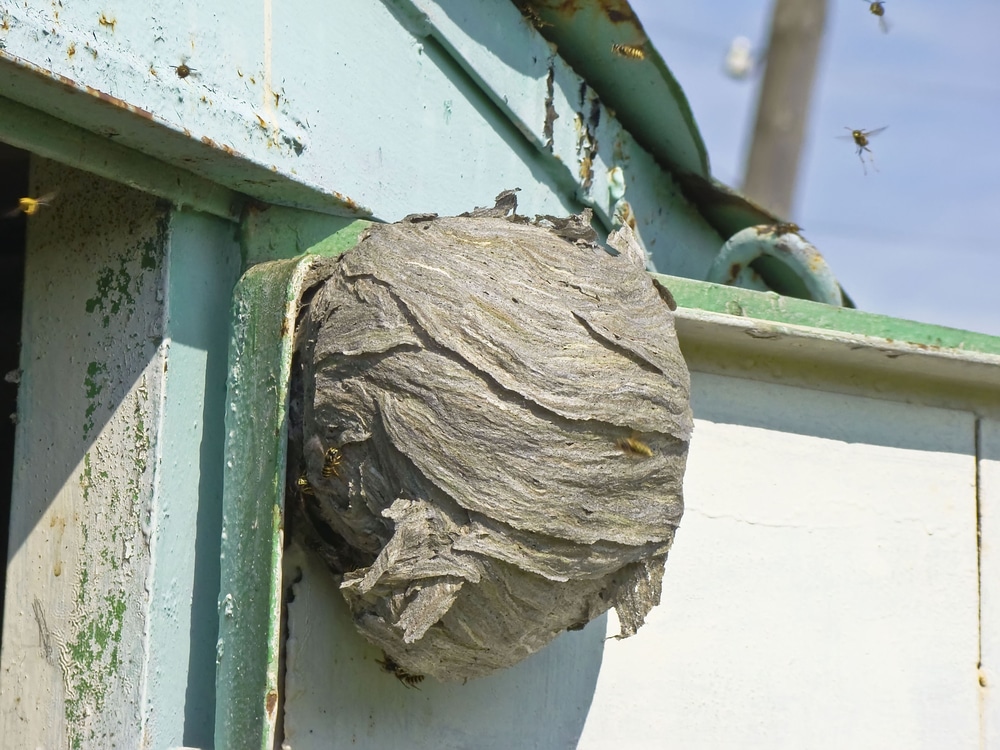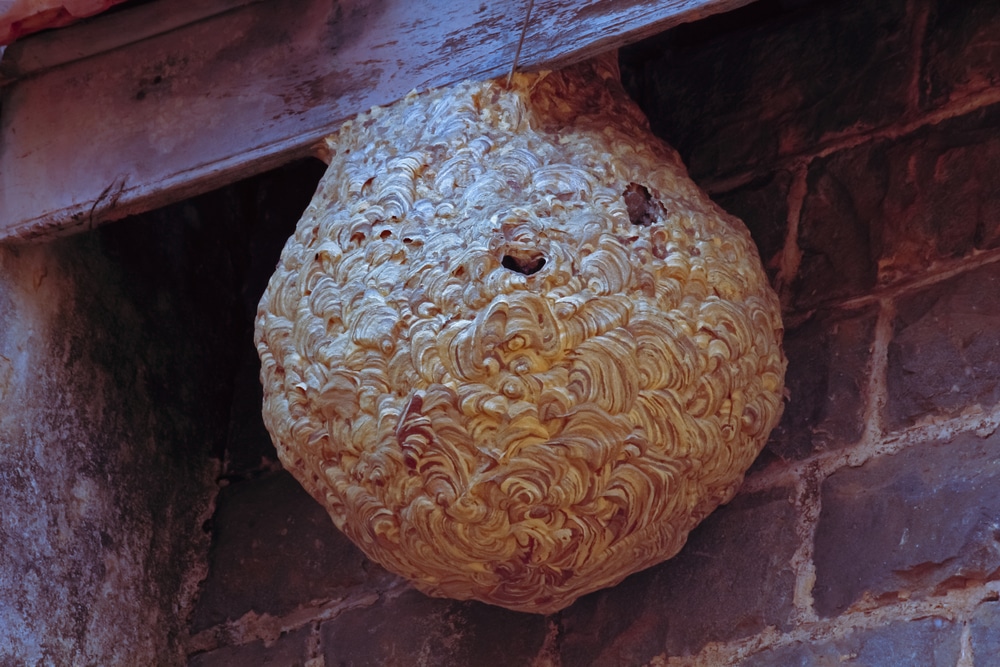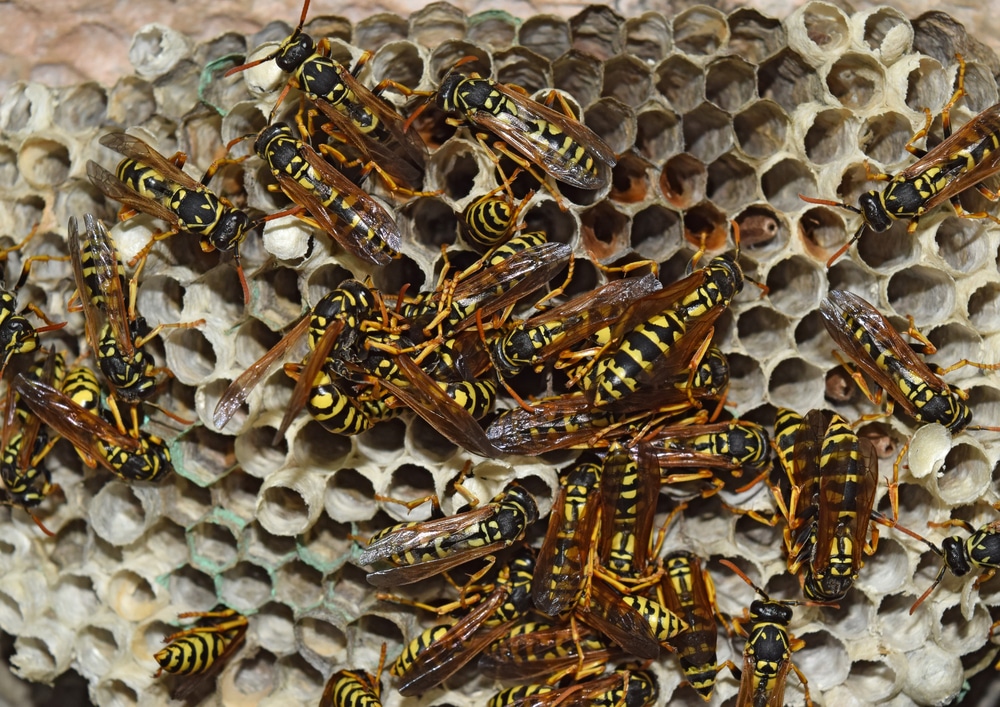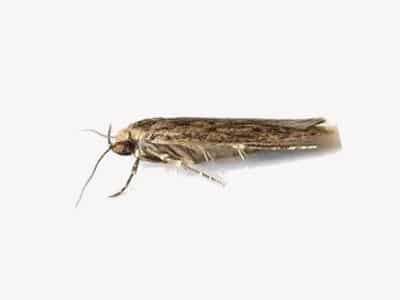Finding a wasps’ nest in or around your home is a bit of a shock, especially if you have never seen one of these alien looking structures before. Quick to attack in defence of their home, wasp nest removal is a tricky task, and you are always best to call in the pros.

Wasps nests are incredible feats of natural engineering with the queen wasp and worker wasps creating a papery masterpiece of swirls and patterns ranging from the size of a golf ball to the size of a football, or even larger.
They might be an impressive sight, but a wasp nest can be very dangerous if disturbed and it it is essential to get rid of the nest as soon as you can, especially if you have children and pets nearby.
Disturb the nest accidentally or make a mistake trying to remove it yourself with DIY products, and you could bring down the wrath of the entire wasp colony, an experience that will be painful at best, and potentially very dangerous at worst.
The fastest, easiest, and safest way to get rid of a wasp nest is to use the services of a local pest control professional.
Spray the nest, drown the nest, destroy the nest with a hammer (please don’t do this), the internet is full of DIY nest removal guides promoting dodgy and dangerous ways to solve wasp issues. If you are looking for a quick and easy way to cover your body in painful stings, this a fantastic place to start!
Or, you could call up Pest Solutions, one of the leading wasp nest removal companies in the UK, and get your nest safely and quickly removed without putting anyone in danger.
To get a free quote for wasp nest removal contact Pest Solutions today on 0800 027 2555.
Wasp nests are made from a combination of paper pulp and saliva with the pulp being produced by special glands within the mouth of the wasps themselves.

When combined with saliva, the substance becomes sticky and can be used to create intricate structures within which the Queen wasp will lay her eggs.
Wasp nests tend to be started by a single queen wasp and then built up over time by workers who will expand the nest as the Queen continues to lay eggs.
An average wasp nest takes somewhere between two and four weeks to build.
If you are reading this article, chances are you have already found a wasp nest on your property! If this isn’t the case, and your suspicions have simply been raised by an increase in wasp activity, keep an eye out for the following common signs that a wasp nest isn’t too far away.
There are plenty of ways that a single wasp could find their way inside your home, but if you are constantly finding wasps inside a room with closed windows, there is a good chance the problem lies inside rather than outside the home.
If you have carefully checked for cracks in the exterior of your home, consider if there are any holes or gaps leading from your living space into your attic or wall cavities. If this is the case, you may well have found the likely location of a wasps nest.
Sounds obvious, but many people don’t have a clue what wasp nests actually look like. If you have spotted a grey or light brown ball, anywhere between the size of an egg and the size of a football inside or outside your property, it is almost certainly a wasp nest and its time to call in the pros.
Wasp nests are incredibly feats of architecture and will often feature intricate patterns and swirls visible from the side and below.
Finding a wasp in your kitchen or buzzing around your garden during the summer months is completely normal, and is normally no cause for alarm.
If you are finding wasps in your property on a daily basis, however, or seeing multiple wasps in one area, it could be an indication that there is a nest nearby.
Firstly, hornets are actually a species of wasp, so all hornet nests are technically wasps nests anyway.
They are also pretty rare in the UK meaning the chances are that the nest on your property is made by a more common species such as the Vespula vulgaris.
If you have seen insects entering and leaving the nest, or in the nearby vicinity, you may also be able to tell the difference based on their size as hornets are significantly larger and pointier than the common wasp.
Big difference. Both go buzz but they are very different insects in many ways, including appearance, behaviour, and protected status.
Bees have a hairy body what allows them to collect pollen more effectively whilst wasps are more streamlines, bald, and shiny in appearance.
Unlike wasp and bumble bee nests that are used for just one year, honey bee nests last for many years and can be home to several thousand worker bees.
It is commonly believed that bees are less aggressive that wasps, and whilst there is some truth to this, neither species will tend to attack unprovoked and both will attack if they feel that their nest or queen is seriously threatened.
Bees are NOT considered as a pest species and are one of the most highly protected insect species in the UK. If you believe you have an unexpected bee hive on your property call your local beekeeper who will be able to advise and may be able to come and collect the hive.
If you discover a wasp nest in your property, call a professional wasp pest control company immediately.

If there are wasps in the nest, and they feel threatened, they can attack in large numbers, making them far more dangerous than a single wasp and increasing the threat of allergic reactions
In general, a single wasp sting will not cause serious health problems beyond a pretty painful sting, unless you happen to be allergic to wasp stings. However, a mass attack from a large number of angry wasps is a different story and multiple stings can lead to anaphylactic shock in some instances.
Wasps are particularly aggressive in late summer but will always defend their nest if they feel threatened. If you find a wasp nest in the winter, the chances are that it has been abandoned as worker wasps will have died off and the queen wasp will generally build a new nest in the spring rather than returning to an old one.
Whilst a wasp problem can be distressing, these insects do tend to keep themselves to themselves unless disturbed (apart from stealing a corner of your home that is). Unlike other pests, wasps don’t spread diseases or attract other pest species, and despite building their nests from wood, rarely do significant damage to property either.
By far the biggest danger is posed to those who attempt to remove or destroy the nest without the knowhow or do not wear protective clothing. Trying to remove the nest using a bucket of water, insecticide spray, brute force, or any of the other DIY methods mentioned online can have disastrous consequences and is never worth the risk.
Just because someone claims to offer professional pest control services, does not necessarily mean that they are qualified or have the expertise to remove a wasp nest safely.
Unfortunately, cheap ‘wasp nest extermination’ services that offer to come and remove a wasp nest are often provided by those with no real training or expertise and who do not possess the required protective equipment.
To make sure that the wasp nest removal services you receive are truly professional, only ever use a pest control technician from a BPCA member company.
A professional from Pest Solutions will remove a nest in no time at all using the latest and most effective products and techniques.
For all these reasons, it is NOT recommended that you try and remove wasp nests yourself. Instead, arrange a wasp nest removal service from a local BPCA accredited pest control company like Pest Solutions.
Stop wasps targeting your property in the first place and no wasp nest treatment will be required! Easy right?
Well, if you have experienced a wasp nest in the past, there are a few simple ways to reduce the risk of wasps nesting in your home again in the future.
These include:
Get rid of wasp nests once and for all with professional wasp nest removal services from Pest Solutions. For a free quote or to arrange a pest control technician to visit your property, contact us today on 0800 027 2555.
Learn more about…

Rated 5
Out of updating... Reviews
We are open 24 hours 7 days a week to help with all pest related enquiries.
We are open 24 hours 7 days a week to help with all pest related enquiries.
We are open 24/hours 7 days a week to help with all pest related enqurirs.